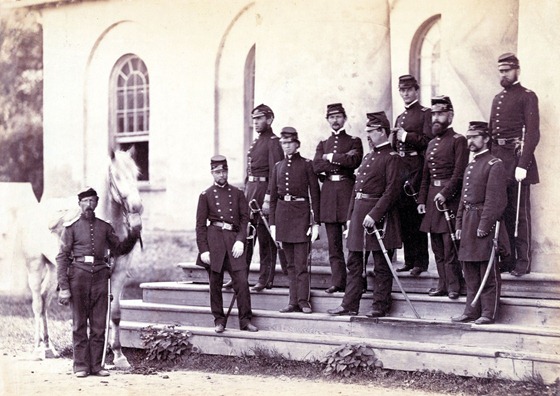Hilton Head, S.C.
July 28, 1862
Tins place is not at all the pestilential spot you all seem to suppose, and if you will convince yourself of that, you will all save yourselves a great deal of anxiety. The deaths here of all descriptions, arising from disease, wounds and accidents, are not more than six a week out of some 5000 men, which is about six per cent a year and that in the very heart of the summer. From this you will see that the station, however disagreeable, and General Williams says it’s the most so he ever saw, certainly cannot be considered unhealthy….
We get nothing new here. Col. Williams’ nomination as Brigadier was among the unfinished business of Congress and so falls to the ground; but I shall act on his staff, though I expect very soon to return to the regiment, though not to my old company…. Ben Crowninshield is at home on furlough and at Sharon…. Lawrence Motley is really down sick, as also is Rand. Greely Curtis has also been on his back — all of them four times as sick as ____. Henry Higginson is acting in command of the regiment and more than a third of the officers are away sick or on detached duty. By way of variety our horses have the glanders and we have lost some forty and not yet succeeded in wholly getting rid of it. So we feel the necessity of some change, somehow.
General Hunter is very unpopular — arbitrary and wholly taken up with his negro question. His one regiment is a failure, and becoming more so, and I have no faith in the experiment anyhow. I smiled audibly at your idea of my taking a commission in one of them; after all my assertion of principles to become a “nigger driver” in my old age, for that is what it amounts to, seeing that they don’t run away, or shirk work or fatigue duty. No! Hunter and you are all wrong, and, for once, the War Department was right. The negroes should be organized and officered as soldiers; they should have arms put in their hands and be drilled simply with a view to their moral elevation and the effect on their self-respect, and for the rest they should be used as fatigue parties and on all fatigue duty. As to being made soldiers, they are more harm than good. It will be years before they can be made to stand before their old masters, unless (and the exception means a great deal) some leader of their own, some Toussaint rises, who is one of them and inspires them with confidence. Under our system and with such white officers as we give them, we might make a soldiery equal to the native Hindoo regiments in about five years. It won’t pay and the idea of arming the blacks as soldiers must be abandoned.
To my mind the ultras are doing all the harm they can and it is yet a question whether they will not save slavery out of this war, rather than let Providence work its destruction in ways other than those preconceived by them. I sincerely hope Sumner will be defeated in the fall election. As to the army, so far as I see it, it is completely demoralized on this question by the conduct of these men, and it makes me sick to hear New England men talk on the subject of the negroes here and all who would aid them. Such prejudice and narrow bigotry I never met in Southerners. There is no abolitionism or, I fear, even emancipation in the army here. The ultras in their eagerness have spoilt all. It is all right, you know, and for the best; but is n’t it enough to make an equine laugh to see a man like Sumner, so convinced that he alone sees the clear way, so absolute in his opinions and wholly devoid of charity to others, withal such an utterly blind instrument in the hand of Providence. The plot thickens and I hope this war will spare me, as I don’t want to die, until I see how all this turmoil, confusion and disaster, is, on pure philosophical principles, to result, as we know it will, in the advancement of the human kind. How much and how long must you and I suffer that that advancement may be worked out.











